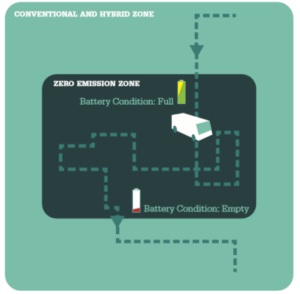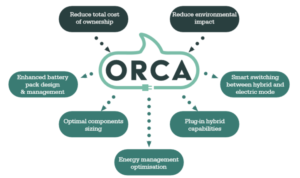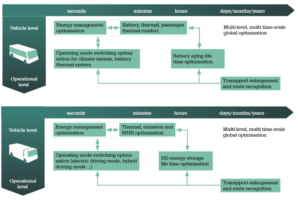Our Project – Objectives
ORCA stands for Optimised Real-world Cost-Competitive Modular Hybrid Architecture for Heavy Duty Vehicles
Further
ORCA has the ambitious goal to develop an IVECO multimodal hybrid bus and VOLVO distribution hybrid truck with an extended full electric range from 10km to 30km. Vehicles will be equipped with innovative PHEV rechargeable energy storage (RES) systems, designed specifically for each vehicle application.
Greener
Not only will the prototype IVECO multimodal hybrid bus and VOLVO distribution hybrid truck have an improved range but both vehicles will also be developed to operate in low emission zones using advanced control systems.
Carbon dioxide emissions need to be drastically reduced to meet the terms of the EU 2030 climate and energy framework. The framework contains a binding target to cut emissions in EU territory by at least 40% below 1990 levels by 2030. The ORCA heavy-duty vehicles prototypes aim at a 40% reduction in fuel consumption and 40% reduction in emissions.
Better
The total cost of ownership (TCO) remains the same in comparison to their conventional counterparts.
Bringing the cost of a hybridised vehicle down requires generating a combined impact on overall system cost, efficiency and operational cost. Moreover, the newly developed applications will have the same performance and functionality.
This requires technical innovations in the engine, powertrain and battery design. ORCA has set itself specific targets:
=> Improve the hybrid powertrain efficiency up to 5% compared to actual IVECO hybrid bus and conventional trucks through optimized RES selection & sizing and by improving the energy and combustion engine management.
=> Downsize the engine by at least 50% compared to actual IVECO hybrid bus and VOLVO conventional truck
Achieving these key innovations at affordable cost will significantly strengthen the European technical and technological leadership in the value chain of heavy-duty vehicles, enabling a leading position in this crucial field of hybridised vehicles and increasing the competitiveness of European heavy-duty road vehicle manufacturers and suppliers.
It is foreseen that the technology will be ready for its first market introduction between 2021 and 2022.



